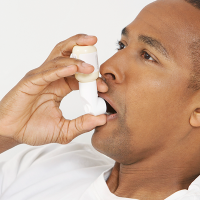Asthma and Its Symptoms
In his book, Essential Allergy,Niels Mygind defines asthma as, “A lung disease characterised by: 1, variable and reversible airwayobstruction; 2, airway inflammation; and 3, bronchial hyper-responsiveness.”
Asthma is a disease where bronchial tubes are sensitive to irritants, whichcause them to inflame and produce difficult breathing.
The inflammation can cause
- contraction of muscles around the air passages,
- swelling of the airway lining due to airway inflammation, and,
- excessive mucus in the airways.
Asthma occurs in most western countries and is the leading chronic illness ofchildren.
Asthma, in some cases, cannot be cured, but for most patients it can becontrolled so that they have only minimal and infrequent symptoms and they canlive an active life.
If you have asthma, managing it is an important part of your life. Controllingyour asthma means staying away from things that bother your airways and takingmedicines or natural remedies as directed by your doctor.
When a person experiences a worsening of their asthma symptoms, it is called anasthma episode or, in severe cases, an asthma attack. During an asthma attack,smooth muscles around the bronchial tubes contract, making the airway openingsnarrower so less air can flow through.
Inflammation increases and the airwaysbecome more swollen and narrow. Cells in the airways also make more mucus thanusual, which narrows the airways further. The changes to the airways cause thesymptoms of asthma.
Asthma attacks are not all the same-some are worse than others. In a severeasthma attack, the airways can close so much that not enough oxygen gets tovital organs. This condition is a medical emergency. People can die from severeasthma attacks. A person suffering from an asthma attack has a sensationsimilar to drowning.
Learning the warning signs or asthma symptoms can often alert a sufferer intime to take preventive action, such as medication or natural remedies.
Asthma attacks can occur over a long period of time. Although there are timeswhen acute episodes strike asthmatics, most asthma sufferers say that there arelong periods during which they suffer few, if any, asthma symptoms.
Here are some asthma symptoms:
- Coughing. Coughing in people with asthma is often worse at night or early inthe morning, making it hard for them to sleep. This may be the only symptom achild with asthma has.
- Wheezing. Wheezing is a whistling or squeaky sound when you breathe.
- A tight feeling in the chest. This can feel like someone is squeezing orsitting on your chest.
- Shortness of breath. Asthma sufferers often say they can’t catch theirbreath, or they feel breathless or out of breath.
- Narrowing of the air passages in the lungs and hence increased resistance toairflow.
- Significant reversibility with steroid drugs
- Symptom-free periods
- Frequent occurrence of allergy
- Inflammation of the air passages
- Bronchial hyper-responsiveness to non-specific stimuli such as cold air, airpollution, pollen, dust, or other irritants
- Asthma symptoms brought on by exercises
- Coughing or wheezing brought on by prolonged crying or laughing
Not all people have these symptoms, and symptoms may vary from one asthmaattack to another. Some symptoms are mild and some are life threatening.
Symptoms also differ in how often they occur. Some people with asthma only havesymptoms once every few months, others have symptoms every week, and stillother people have symptoms every day.
Learn how to use natural remedies to reduce asthma attacks and to eliminatemany of the asthma symptoms.




